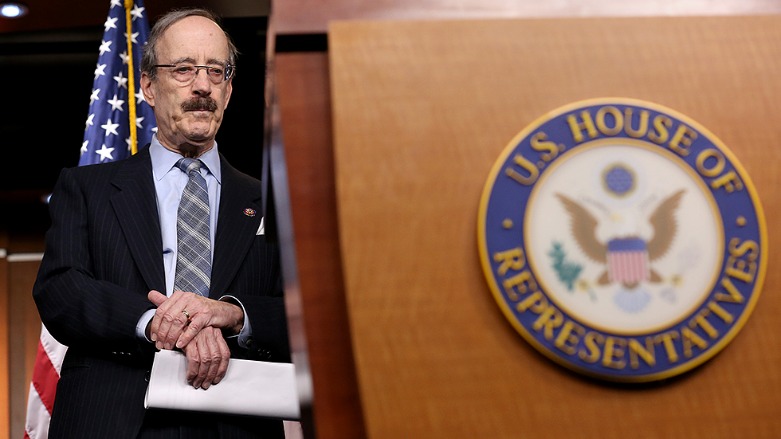US House Committee presses to protect Kurds in Syria

WASHINGTON DC (Kurdistan 24) - “I think it’s a terrible mistake,” Rep. Eliot Engel (D, New York), Chairman of the House Foreign Affairs Committee, said on Wednesday as he described President Donald Trump’s decision to withdraw US forces from Syria.
“One of the reasons” Engel disagrees so strongly, he explained, is “because we have had the Kurds fighting side by side with us as our loyal and faithful allies.” They have “absorbed a lot of casualties” and “prevented Americans from being killed.” And “now to leave and abandon them” would “send a message that the United States is an unreliable ally.”
So “why would anybody want to be our allies in the future?,” Engel pointedly asked Amb. James Jeffrey, US Special Representative for Syria Engagement and Special Envoy for the Global Coalition to Defeat ISIS, at a Committee hearing on Wednesday.
Indeed, that was the first of several such questions Jeffrey was asked, as congressmen repeatedly expressed their concern about the planned withdrawal of most US forces from Syria, and, specifically, its impact on the Kurds.
Rep. Michael McCaul (Texas), the ranking Republican, seconded Engels’ statement. “I want to associate myself with your remarks,” he said. “I think an American presence is absolutely essential in Syria.”
Without that, “the Russians and Assad will have free rein. The Iranians would move in, the Turks would destroy—absolutely slaughter the Kurds,” McCaul warned.
During the hearing, Jeffrey revealed some details about the negotiations on a safe zone in northern Syria. Turkey is asking for a 30 kilometer zone, he said. But “we don’t think we can do 30 kilometers, so we’re going back and forth with them on how deep the safe zone would be.”
Pressed by Rep. Brad Sherman (D, California) as to how it would work, Jeffrey replied that the Kurdish Peoples’ Protection Units (YPG), who provide the military leadership of the Syrian Democratic Forces (SDF) and many of its fighters, would withdraw, and “local forces,” along with the US and Turkey, would “figure out what we would do in the safe zone.”
Sherman responded coolly. He was not sure, he said, “that’s a workable approach.”
The US remains committed to UN Security Council Resolution 2254, which was approved some four years ago, in December 2015. It calls for a Syrian ceasefire and a political settlement based on UN-supervised elections.
But the Assad regime is much stronger now than it was then, and it is difficult to envisage a meaningful implementation of that resolution in the foreseeable future. Indeed, McCaul expressed his skepticism.
Rep. Bill Keating (D, Massachusetts) pressed Jeffrey as to what the US could do “of a concrete nature” to protect the Kurds.
Syrian Kurds will be protected, like other Syrian citizens, Jeffrey said. First, by maintaining Syria’s territorial integrity, and then through “a political process that sees every Syrian citizen having the same sort of rights and obligations that we take as normal here.”
Keating had asked about the threat Turkey will pose to the Kurds once US forces are withdrawn. That is an immediate, short-term issue. But Jeffrey responded in terms of a broad resolution of the Syrian conflict—a distant prospect at best.
So yet another committee member pressed Jeffrey for an answer. Rep. Gerry Connolly (D., Virginia) stated, “The Turks have insisted that in territory” that was “hard fought for and won by our Kurdish allies,” they “need to vacate that land” or else Turkey will intervene militarily.
“Does the United States have a point of view?,” Connolly asked.
Jeffrey responded that the US recognized Turkey’s security concerns, as it recognized the US “debt to the SDF.” Thus, “our concern that we have a compromise way forward, which is what we’re trying to do with both the SDF and the Turks right now.”
“I think I’m going to spend months trying to decipher that answer,” Connolly said with a sigh.
Connolly was right, of course. At no point in the hearing did Jeffrey explain clearly how the US could withdraw the bulk of its forces and prevent a major clash between Turkey and the YPG.
Indeed, Engel responded to that exchange, by underscoring Connolly’s point.
“I share his concern,” Engel said. “I hope” that the US will not be withdrawing from Syria “and leave the Kurds in jeopardy.”
“It would just be the wrong thing to do morally,” Engel continued. “It would send the wrong message:” that the US is an unreliable ally. “I don’t think that’s true, and I don’t think it’s something that we want to be known for.”
“It’s really, really important that we look out for the well-being of the Kurdish people in that region,” he concluded.
Editing by Nadia Riva
